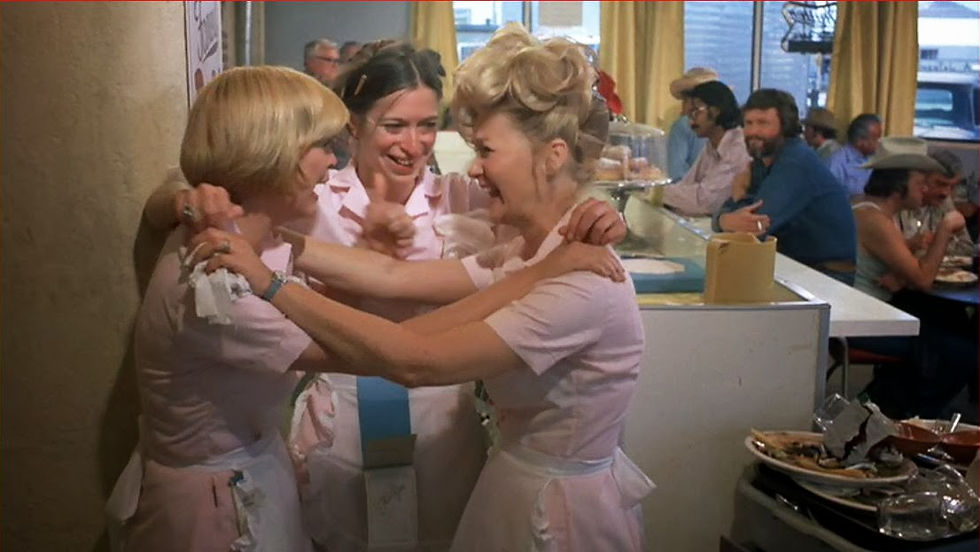Alice Doesn't Live Here Anymore (1974)
- Soames Inscker

- Sep 2, 2025
- 4 min read

Directed by Martin Scorsese and released in 1974, Alice Doesn’t Live Here Anymore is a poignant, character-driven drama that weaves together themes of female independence, resilience, and the search for identity.
Starring Ellen Burstyn in an Oscar-winning performance, the film broke away from Scorsese’s usual gritty male-centric narratives and instead offered a raw, empathetic portrayal of a woman rebuilding her life after loss. The film stands as both a product of its time—the feminist stirrings of the 1970s—and as a timeless story of personal reinvention.
The story opens in a surreal, almost fairy-tale-like prologue, set against the dreamy backdrop of a child’s imagination. Young Alice Hyatt (Mia Bendixsen) dreams of a grand, glamorous life as a singer. Fast forward to adulthood, Alice (Ellen Burstyn) is a housewife in Socorro, New Mexico, trapped in a dull marriage to Donald (Billy Green Bush), a distant and irritable husband. When Donald dies suddenly in a car accident, Alice is left widowed and financially precarious, with her precocious 11-year-old son Tommy (Alfred Lutter) to care for.

Determined to pursue her long-abandoned dream of becoming a singer, Alice embarks on a road trip with Tommy in search of both work and a sense of self. Their journey is punctuated by hardship and disillusionment: she secures a few singing gigs but finds that the music industry is indifferent to her ambitions. She also encounters problematic men, including the dangerously volatile Ben (Harvey Keitel), whose charm turns swiftly into menace.
Eventually, Alice settles in Tucson, Arizona, where she takes a job as a waitress in Mel’s Diner. It is here that she encounters a different kind of stability, forming friendships with her co-workers—most notably the sharp-tongued Flo (Diane Ladd)—and beginning a relationship with rancher David (Kris Kristofferson). Alice is forced to weigh her dreams of stardom against the realities of love, responsibility, and building a new life for herself and her son.
Ellen Burstyn delivers a tour-de-force performance, brimming with vulnerability, humour, and strength. Her Alice is never reduced to a stereotype; she is flawed, funny, sometimes impulsive, and always deeply human. This layered portrayal earned Burstyn the Academy Award for Best Actress.
Alfred Lutter as Tommy brings a natural, unaffected charm, balancing cheeky humour with moments of real poignancy. His mother-son dynamic with Burstyn grounds the film emotionally.
Harvey Keitel, though appearing briefly, is unforgettable as Ben, a deceptively charming suitor whose dark side emerges violently. His presence adds an unsettling tension that showcases Scorsese’s knack for portraying dangerous masculinity.
Kris Kristofferson offers a quiet, understated performance as David, a man who represents stability and a second chance at love. His natural charisma complements Burstyn’s more fiery energy.
Diane Ladd, as Flo, provides comic relief and grit, earning an Academy Award nomination for Best Supporting Actress. Her lively, brash presence brings vibrancy to the diner scenes.
While the subject matter was driven by Ellen Burstyn’s vision—she was instrumental in hiring Scorsese as director—the film bears his unmistakable stamp. Scorsese captures Alice’s struggles with a realism that avoids sentimentality. His use of handheld camerawork and naturalistic dialogue situates the viewer firmly in Alice’s world, particularly in the diner sequences, which pulse with chaotic, lived-in energy.
The opening prologue is particularly notable, with its stylised Technicolor-like palette and dreamy atmosphere, deliberately evoking 1950s melodrama. This sequence contrasts sharply with the raw naturalism that follows, highlighting the gap between Alice’s childhood dreams and her adult reality.
At its core, the film is about a woman asserting her autonomy in a world that often denies it. Alice is not defined by her role as wife or mother; she demands space to pursue her own aspirations.

The film questions whether dreams of fame and glamour can survive the demands of everyday life. Alice’s singing career never takes flight in the way she hoped, but she discovers fulfilment in unexpected places.
The tender yet often tense relationship between Alice and Tommy underscores the sacrifices inherent in parenthood. Their bond remains the film’s emotional anchor.
Alice’s romance with David highlights the balance between independence and connection, asking whether true love can coexist with self-determination.
By situating much of the film in Mel’s Diner, Scorsese and screenwriter Robert Getchell capture the gritty reality of working-class women in the 1970s, prefiguring the later television series Alice (1976–85).
Upon release, Alice Doesn’t Live Here Anymore was both a critical and commercial success. It resonated with audiences during the women’s liberation movement, speaking directly to issues of independence and identity. Ellen Burstyn’s Oscar win solidified her reputation as one of the era’s finest actresses.
The film also broadened Martin Scorsese’s career, demonstrating his ability to work outside the crime genre and handle intimate, character-driven stories with nuance. It inspired the long-running sitcom Alice, though the series adopted a much lighter, more comedic tone.
Today, the film remains a landmark in feminist cinema of the 1970s, and one of the rare Hollywood features of the time to centre a middle-aged woman’s story with such depth and empathy.
Alice Doesn’t Live Here Anymore is a moving, beautifully acted portrait of reinvention. It blends Scorsese’s unflinching realism with Ellen Burstyn’s luminous, Oscar-winning performance, resulting in a film that is both a product of its feminist era and an enduring human story. It explores the tension between dreams and responsibilities, between independence and intimacy, ultimately affirming the resilience of women determined to carve their own paths.
It is not just a Scorsese film—it is a milestone in American cinema that continues to feel relevant, fresh, and emotionally truthful.



